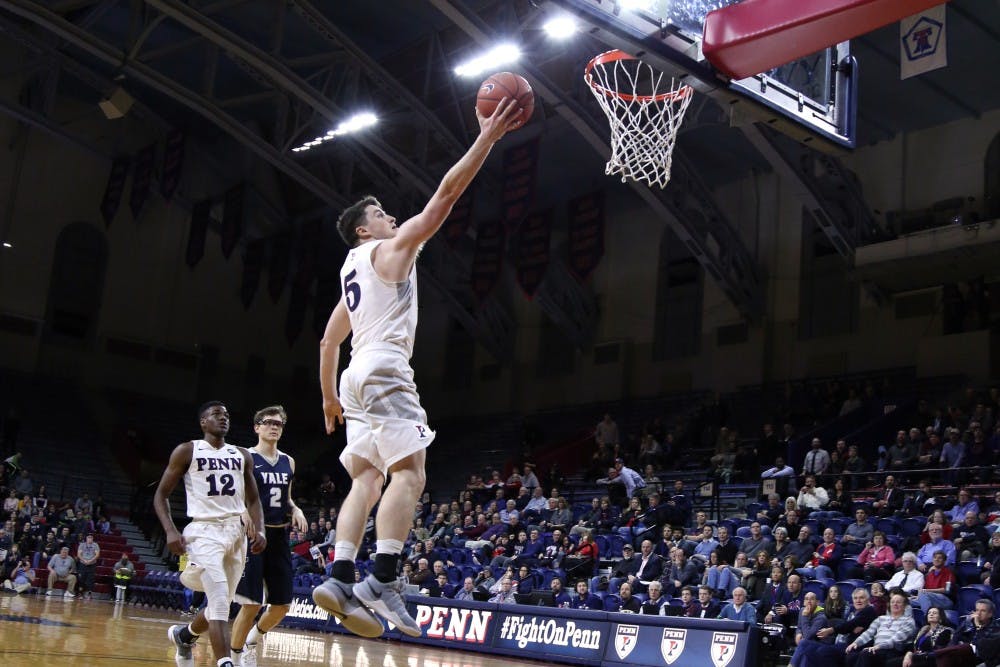
When the Ivy League Tournament was first announced last year, Penn men’s basketball knew it would only increase the frenetic energy associated with the team's conference match-ups. With the tournament cutoff set at fourth place, the goal for the competition’s inaugural season was always to make the tournament.
Those hopes took a dent on Friday night, as the Yale Bulldogs stormed into the Palestra and handled the Quakers, 68-60. The Red and Blue never led in the game, and it was defense that kept them in the contest early. However, as the game wore on, the lack of offense and second-chance points doomed any hopes of a Penn comeback.
The Bulldogs (9-5, 1-0 Ivy) started a much taller lineup than the Quakers (6-7, 0-2), so competing on the boards was naturally going to be a challenge. As the game progressed, it proved to be just that — Yale out-rebounded Penn 42-31, including 10 offensive rebounds. Too often for the Red and Blue, a good defensive possession would be spoiled by a second-chance bucket.
Despite the rebounding disadvantage, coach Steve Donahue maintained that the size advantage for Yale only played a significant role because of the poor shooting from the Quakers.
“They’re a good rebounding team,” Donahue said. “We play a smaller lineup like a lot of teams in our league do. When you go up against a team like Yale that’s more traditional, you have to match that physicality. One of the reasons we play small is to get those open shots on the perimeter, and they weren’t falling tonight.”
Another ongoing issue for Penn has been free-throw shooting. Through the first two Ivy games, the Quakers have made a total of 22 from the charity stripe out of 38 attempts, an unimpressive 57.9 percent. For a team that starts four guards — who are generally better free throw shooters than big men — getting points at the line has been a struggle.
The positives were few and far between for the Red and Blue on the night, but one big plus for the Quakers was the scoring from Jackson Donahue. With the rest of the team struggling to get going on offense, it was Donahue who kept Penn in the game early in the second half. If the Quakers can heat up Donahue, who was a reliable scorer for them last season, they have a real chance to get results against the tougher opponents in the Ivy League.
After a disappointing start to Ivy play at Princeton, this game had the feel of a must-win if the Quakers were going to compete for a top spot in the conference. With the loss, Penn now faces more uncertainty over where they stand in the Ancient Eight. In particular, it makes winning Saturday's game against Brown and avoiding an 0-3 start incredibly important. Although the pressure continues to build for the team to earn its first conference win, Donahue is reluctant to call tomorrow’s contest a “must-win”.
“I never think of a game as a must-win honestly,” Donahue said. “We want to win. We want the reward for our hard work. If you start thinking that way it can derail you.”
Surely, whatever importance anyone previously attributed to Saturday's game, it has been significantly increased after tonight. Donahue must now turn his team around for its most important challenge to date.
“I don’t know if there’s anything we can take away from this other than the bitter taste in our mouths of not winning,” Donahue said.
“In this league you get no time to hang your head. You have to compete every night, so these next 22 hours have to be the best 22 hours of the season in terms of preparation.”
The Daily Pennsylvanian is an independent, student-run newspaper. Please consider making a donation to support the coverage that shapes the University. Your generosity ensures a future of strong journalism at Penn.
Donate







